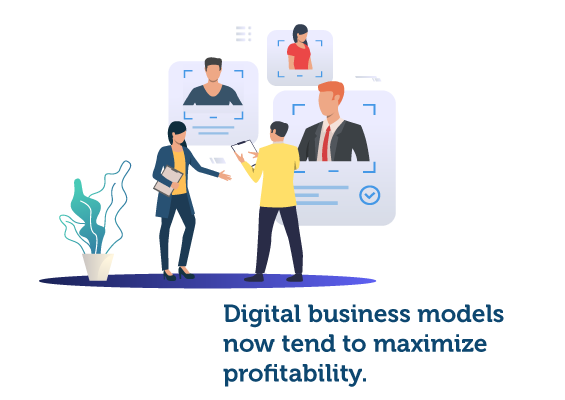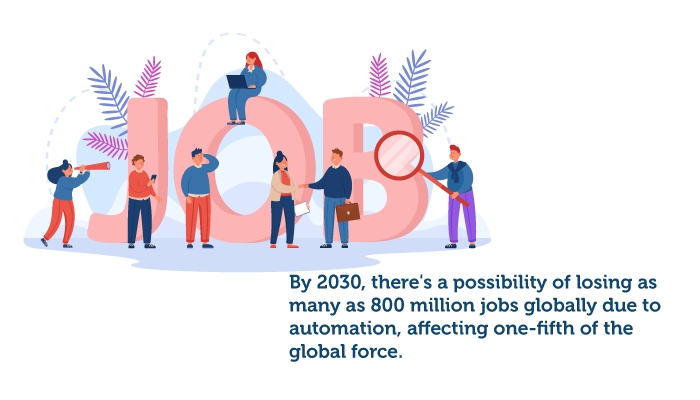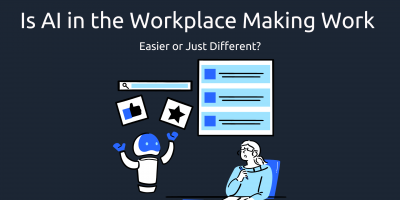
Skills That AI Can’t Replace
Which skills are futureproofed with an irreplaceable “human touch,” and how are emerging technologies driving the evolution of workforce skills?


CEO & Founder of Breadnbeyond

Co-Founder of Milkwhale

Digital Marketing Manager at Explainerd
The explosion of the internet in the last two decades, paired with groundbreaking technological developments, led to the significant expansion of the digital economy.
Research shows that this economic sector grew exponentially faster than any other, holding approximately 15.5% of the global GDP in 2016. By 2025, experts estimate that 24.3% of the global economy will become web-based.
Furthermore, the major historic breakthroughs developed a workforce restructuring and reskilling pattern, gradually repositioning the labor market. Now, the computerization of jobs, and society’s expanding needs, pushed by the impact of the COVID-19 pandemic, are leading to a new work transformation.
It’s only a matter of time until some professions disappear. But, at the same time, new ones will be created thanks to digital expansion.
To answer the question of how many employees the digital economy can absorb, in this article, Shortlister explores the implications of technology, expert opinions on the on the inevitable shift of the labor market, and what this would mean for the future of work.

In defining what the digital economy is, many reference Don Tapscott and his book “The Digital Economy: Promise and Peril in the Age of Networked Intelligence.”
Tapscott pioneered the term long before social media, smartphones, or the expansion of e-commerce and web transactions, predicting many current opportunities and challenges with the digital evolution.
Nowadays, experts broadly describe it as economic activity based on digital technologies and their adoption in transforming services and companies.
However, the web economy consists of many different elements.
These include emerging platforms like social media, digital services, assets like blockchain, mobile technology, (digital) automation and payments, artificial intelligence, and the Internet of Things (IoT). All play a significant role in designing and expanding digital economic activities that create billions of connections daily.

The distinctions between the digital and traditional economies stem from how they discern geographical location, connect businesses and people, and use big data.
However, internet usage is one of the most defining characteristics of the digital economy.
As its pillar, it allows businesses to go beyond physical boundaries, connect with new markets, and acquire customers globally. That can be a disadvantage as it is a benefit since it creates a much more competitive and fast-paced economy.
Another essential characteristic is data.
Digital businesses are data-driven and use vast amounts of real-time information to understand their customers better and improve their performance. It’s also a significant aspect of customer personalization, as businesses use it to offer tailored solutions for consumers based on their online habits, preferences, and concurrent needs.
Finally, the digital economy is direct.
The relationship it creates between a business and a customer is usually free of intermediaries and reduces unnecessary costs by replacing traditional marketing, production, and distribution methods with digital solutions.

According to Statista, almost four out of five people will use the internet by 2030.
The “Digital Economy Compass 2021” report also predicts that new internet users will add $4 trillion of spending power to the economy within this timeframe.
The post-pandemic digital adoption further increased the growth, pointing out the many advantages of the digital economy as the driving force behind its global expansion.
As much as it’s innovative and progressive, there’s also a disruptive side to digitizing the economy.
Many concerns originate from the addictive nature of technology.
Statistics show that 61% of internet users are heavily dependent on it. And another common fear is its effect in the workplace, eliminating jobs by computerizing many tasks.
However, other more pressing issues require attention, especially now that the web economy is expanding its influence.
One of the most essential components that connect the digital economy to the physical world is the Internet of Things (IoT).
It refers to how everyday objects, from smart household appliances to entire security systems or medical sensors, connect to the internet and one another.
This system consists of interconnected “things” that can be anything from home with a built-in smart voice controller, smart cars, a person with a heart rate monitor implant, to animals with health chips.
Using built-in wireless connections and unique identifiers, they can transfer data allowing easy access or control from anywhere.
Thanks to the evident benefits, the IoT is slowly making its way into most industries, introducing them to a more automated way of operating, which can provide efficiency and reduce labor costs.
The IoT automates many business processes by collecting, computing, and analyzing data, enabling innovative and efficient solutions. That’s why it’s an essential aspect of the global digital economy and one of the most critical technologies that have the potential to change entire industries.
Following the Fourth Industrial Revolution, also known as Industry 4.0, businesses, sectors, and entire economies had to react quickly and adapt to the ever-growing technological advancements characterized by interconnectivity and automation.
The emergence of the digital economy instigated new market transformations based on digital technologies. Around the same time, the internet economy as a term made its appearance.
These two are synonyms in the sense that both unanimously explain how the internet boom influences business models. However, digital is different from the internet economy in a way that covers a broader spectrum of economic activities.
The web-based economy consists of businesses and markets whose whole infrastructure depends on internet connectivity.
Digital economic activity, on the other hand, goes beyond the world wide web, exploring all parts of the economy transformed by digitalization and the emergence of new technology.

According to the “Goldfarb and Tucker: Digital Economics“ publication, digital economics explores the unique monetary characteristics that emerged from new business models.
Also, how digital technology reduced storage, computation, and data transmission costs, transforming economic behavior in the process.
From its humble beginning, the internet seemed like a promising platform for exploring new business opportunities. And, once it started to grow, it never really stopped.
At the time, it provided a novel territory for different business models that reformed traditional economics. However, many business models disregarded the importance of cash flow. Focusing solely on growth through trial and error ultimately prompted the discovery of new value propositions and ways to monetize these services.
Digital business models now tend to maximize profitability.
Thanks to the zero replication costs, they can also offer free goods.
There are many ways to create lucrative business models nowadays, especially with the global expansion of the internet and the significant technological discoveries that followed.
However, one aspect that remains a challenge is the complexity and inability to measure digitalization’s impact on the global economy and how it affects new job opportunities in new and existing markets.
There are many free services on the internet that people regularly use.
From Google to Wikipedia, these are just some of the examples. Although they have their source of profit, as long as consumers don’t physically pay for them, these digital services don’t contribute to the gross domestic product as other business sectors do.
Despite the explosion of the internet with all of its digital might and the services people use daily, the contribution of the Information sector to the global GDP remains relatively low. That’s because regardless of the benefits the digital economy contributes to people’s lives, the GDP measures the monetary value of the final goods.
That raises the question of how we should measure the digital economy more effectively, considering the added value in people’s lives.
Experts should estimate the scope of the digitized economy across all industries that benefit and consider the “digital spillover” between businesses that get an immediate productivity boost by implementing some form of digitalization.
To better understand how all aspects of digitalization affect the economy, experts Brynjolfsson and Collis of MIT Initiative on the Digital Economy, in collaboration with Felix Eggers of the University of Groningen, developed new techniques to measure unpaid digital goods and services.
According to their research, between 2004 and 2017, Facebook provided more than $200 billion worth of uncounted value for consumers, yet none of it ever showed up in GDPs.
Pointing out the consumer value of free digital services and their effect on economic well-being, they propose a way to measure how much people benefit from them instead of using traditional metrics like the GDP or productivity.
The research further shows how businesses can estimate value.
Namely, even though the consumer surplus of digital goods is high, companies can only capture a small percentage of that value.
So, using the proposed methods and keeping track of consumer satisfaction, managers can estimate the total value and its implications for further investment and long-term feasibility.
New technology has always been one of the main instigators of job shifts. But, what the COVID-19 pandemic did, no one could have seen it coming.
McKinsey Insitute estimates that the pandemic caused an increase of 25% in workers that needed to switch occupations.
The post-pandemic economy set in motion the Great Resignation, with hints of a possible four-day workweek implementation. But, perhaps the most significant impact on the workforce was the remarkable expansion of remote work.
The McKinsey survey revealed that switching to a more hybrid work model decreased demand for retail, hospitality, and tourism, estimating that business travel will likely drop 20% after the pandemic, causing shortages in hospitality, aerospace, and food service employments.
However, e-commerce businesses and other booming digital services during the pandemic are likely to continue, opening new job opportunities.
The digitalization of businesses proved to be an advantage during the restrictions, and parts of the internet economy noticed significant growth. For example, e-commerce grew two to five times, and digital services like telemedicine, online banking, and streaming entertainment also gained momentum.
To answer what the future of work will be is not easy, considering there are factors we can’t predict.
However, the shift to digital technologies and the rise of artificial intelligence and automation are doing what mechanization did in the past. They are changing the job demand and supply landscape and allowing employers and employees to explore new work opportunities.
Natasha Rei, Digital Marketing Manager of Explainerd, agrees with the sentiment:

Although seemingly, there should be a significant skill gap with the emergence of new technologies, the digital economy can soften the blow by absorbing skilled workers from reducing or disappearing sectors.
Digital innovations are already changing the demand for hard and soft skills in the labor force, causing old industries to shrink while accelerating the creation of new ones.
For example, China’s workforce saw an increase in e-commerce, delivery, and social media jobs, with more than five million new positions opening in the first half of 2020.
Andre Oentoro, CEO and Founder of Breadnbeyond, explains these employment opportunities: “The digital economy is still in its early developmental stages, so it is hard to predict how many employees it can eventually absorb.
However, given the current trends, it is safe to say that the number will be substantial.
That is because digitalization brings with it a new set of opportunities.
A company can hire employees from anywhere worldwide, regardless of their location. As they can tap into a global pool of talent, it means that the digital economy can absorb more employees than ever before.”
However, this economy can potentially increase employment inequality, creating the risk for low-skilled workers to be displaced by new technologies or overqualified workers to accept jobs requiring lower education levels.
For a more effective absorption of competent workers in the emerging digital workforce, employers and employees should invest in education and technical training for skills that are increasing in demand with the expansion of the internet economy.
Ebnu Sudarso, Co-Founder of Milkwhale, agrees with the idea of reskilling, adding: “The digital economy is growing as we speak. You might have seen a lot of job openings in this sector, which will keep increasing as we embrace technological development.
I don’t think there is a limit to how many employees the digital economy can absorb.
It all depends on how many employees are looking to increase their skill set and immerse themselves in the digital world.”

Post-pandemic economic activity, characterized by remote working opportunities, the Great Resignation, labor shortage, and a significant digital boost, is transforming the workplace.
McKinsey Institute report predicts that by 2030, there’s a possibility of losing as many as 800 million jobs globally due to automation, affecting one-fifth of the global force. On a more positive note, artificial intelligence could keep equal opportunities and create as many roles as it replaces, or even more.
After all, with the different digital technologies came the rise of new occupations like data scientists, digital analysts, virtual reality architects, business intelligence managers, and many others that were once inconceivable.
Research by the OECD also reveals that the productivity fueled by technological advancements eventually leads to higher employment, compensating for displacing jobs. So, there’s a good chance for the new labor market to absorb workers from different industries affected by the latest technologies’ expansion.
Overall, to prevent unemployment or labor shortages, the structural changes and disruptions in the labor market require better responsiveness of the educational systems and active labor market policies that support reskilling and improve employability.
As much as it’s innovative and progressive, there’s also a disruptive side to digitizing the economy.
Many concerns originate from the addictive nature of technology.
Statistics show that 61% of internet users are heavily dependent on it. And another common fear is its effect in the workplace, eliminating jobs by computerizing many tasks.
However, other more pressing issues require attention, especially now that the web economy is expanding its influence.
Digital transformation can change all aspects of a company’s operation, increasing employee and customer satisfaction.
It’s also a great way to reduce costs and increase business revenue, providing customer-centric solutions that make the product or service more accessible.
Many companies strive to implement new and innovative ways of doing business. Still, some excel in this, for example, Netflix, which went from a mediocre video-rental company to one of the biggest streaming platforms in the world. The company did it by digitalizing what was already its line of work and switching to a subscription-based model that helped the company reach a mass market without geographical restrictions.
Microsoft, Adobe, Spotify, and Dropbox are other thriving businesses that opted for a subscription-based model as part of their digital transformation.
UPS’s shipping and supply chain management company led another successful transformation by simply implementing real-time package tracking and speeding up their delivery process. Similarly, DHL also made efforts towards digitalization, investing two billion dollars in their project “Delivering excellence in a digital world.”
From Tesla to Lego, there are many success stories of companies reaching global recognition. Although the approach varies, what’s mutual for all is recognizing the benefits and quickly responding and adapting to new technologies.
The digital revolution is so influential that it affects all industries, even those that are “least digital.”
Although we can’t say with certainty how this will progress in the future or what to expect from the labor market, one thing is for sure. The digital economy will continue expanding, with predictions that the digitally-enabled business models will be responsible for approximately 70% of the total economic value over the next decade.
Browse our curated list of vendors to find the best solution for your needs.
Subscribe to our newsletter for the latest trends, expert tips, and workplace insights!

Which skills are futureproofed with an irreplaceable “human touch,” and how are emerging technologies driving the evolution of workforce skills?

With the rise of AI in the workplace, its impact has become multi-dimensional. While there is no doubt about its ability to reduce manual labor, this technology also reshapes job expectations, creating new opportunities and challenges.

As machines take on more at work, the question isn’t how fast AI can go, but whether we’re ready for where it’s taking us.

Are you ready to navigate the uncharted waters of AI regulation in 2025, where innovation races ahead, but the rules are still being written?
Used by most of the top employee benefits consultants in the US, Shortlister is where you can find, research and select HR and benefits vendors for your clients.
Shortlister helps you reach your ideal prospects. Claim your free account to control your message and receive employer, consultant and health plan leads.